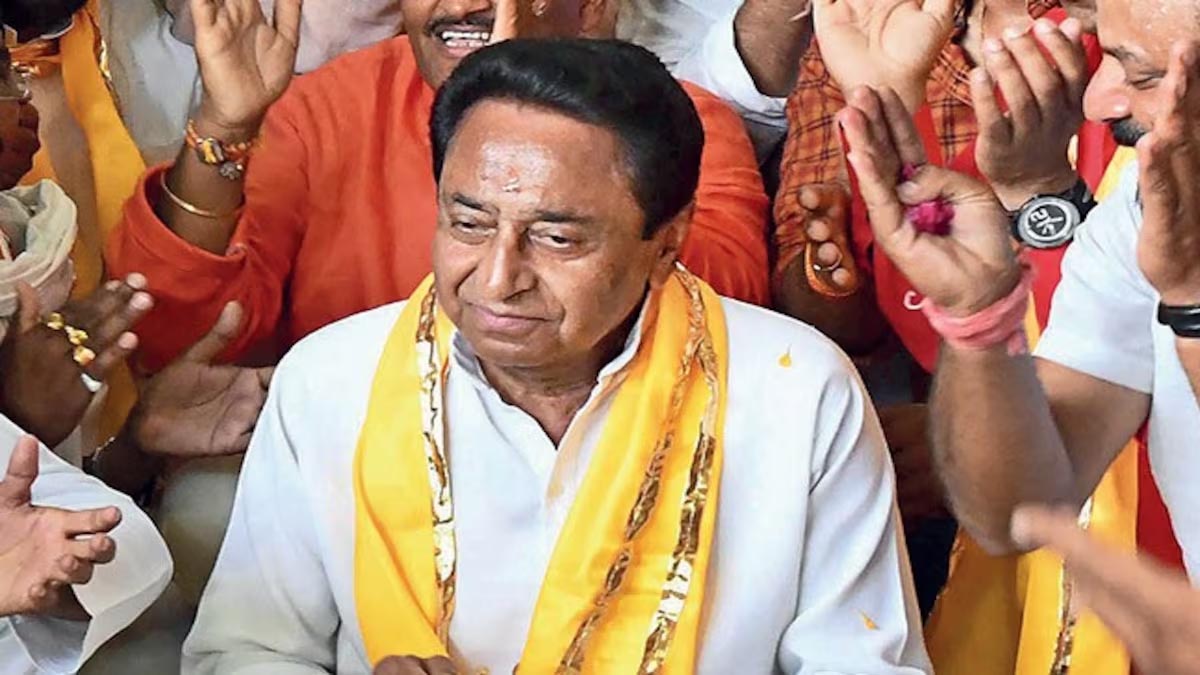In a recent interview with The Indian Express, senior Congress leader and former chief minister of Madhya Pradesh Kamal Nath said, in an election rally, that the BJP should not forget that the locks of the Ram Temple were opened by Rajiv Gandhi. He was trying to counter the BJP’s claim, by saying that the saffron party was not justified in taking all the credit for the construction of the Ram Temple in Ayodhya! His statement is very significant in a politically-charged Madhya Pradesh. The assembly elections are scheduled for November 17.
Ahead of the polls, the BJP is trying to polarise the voters on religious lines and demonise the Congress party as “pro-Muslim” and “anti-Hindu”. Thus, the BJP is spreading the propaganda that it was due to the efforts of the BJP and the RSS that the Ram Temple could be constructed in Ayodhya. Amid this, Madhya Pradesh Congress president Kamal Nath was desperate to prove himself and his party to be more pro-Hindu than the BJP.
According to media reports, Kamal Nath and other Madhya Pradesh Congress leaders have repeatedly played the soft Hindutva card. In the party events of the state Congress, religious leaders of the Hindu community have been invited. Moreover, the senior party leaders have been busy with posting their pictures at temples and the image in which they are seen getting blessings from the priests.
Leading from the front. Kamal Nath has not fought shy of calling on Hindutva religious leaders. On several occasions, Kamal Nath has committed himself to be working for the Hindu faith and culture. Apart from them, a promise was made to buy cow dung from the Goshala and to mobilize support for the construction of Mata Sita Temple in Sri Lanka. By analysing his recent gestures and statements, it appears that he is more relying on the success of a soft Hindutva card than following his own party’s stated principles of secularism, pluralism and minority rights.
If the poll strategy of Kamal Nath is anything to go by, Nath is trying to defeat hard Hindutva with soft Hindutva. He is not alone in the party to think and act similarly. A large number of Congress leaders believe that the talk of secularism and minority rights is useful while delivering academic speeches and writing research papers. In the private conversation, they argue that this country is swayed by the majoritarian Hindu sentiment and the Congress could only come to power by appeasing the Hindu sentiment.
In other words, right-wing leaders within the Congress party support imitating the BJP. They justify it in the name of hard politics. They do not think it is wrong to use the religious symbols of the majority community. They believe that India is in reality a country of Hindus (albeit those from the privileged castes) and hard politics cannot ignore this fact. Without being quoted, they argue that the Congress party is out of power not because the BJP has achieved wonders. They believe that Congress has –of late –ignored the interests of the majority community and that is why it has lost support among them. To regain the faith of the masses, they favour that the Congress leaders should display Hindu religious symbols and play aggressive nationalism without any hesitation.
After the rise of Hindutva forces in Indian politics, right-wing elements within the Congress have gained strength. It is their lobby which is mounting pressure on the party to desist from speaking on Muslim (minority) issues. We should not forget that the image of former Congress president and the first education minister of India Maulana Azad went missing during a recent Congress meet. Is not this right-wing Congress lobby responsible for the omission of the Maulana?
Contrary to the belief of the right within the party, the history of the Congress party shows that it has, historically, been always, further weakened by playing the communal card. For example, when Indira Gandhi resorted to using Hindu symbols, the party could not be revived. Her acts created further confusion among the voters. A large number of secular voters shifted to the opposition Janta party.
Similarly, when the former prime minister, Rajiv Gandhi opened the gate of the Ram Temple, it served the interest of the BJP which rose (in number of Parliamentary seats ) from a mere two-seat presence to form a coalition government a couple of years later. This Himalayan blunder of Rajiv Gandhi, which is now praised by Kamal Nath, ended the Congress’s dominance in Indian politics with the rise of the BJP. Similarly, the fall of Babri Masjid could not revive Congress, it only strengthened the communal narrative.
So, how does the right-wing ascendance within the Congress party get checked? The best persons to deal with the ideological deviation within the party are Congress president Mallikarajun Kharke, former president Sonia Gandhi, the senior leader Rahul Gandhi and Karnataka chief minister Siddaramaiah. They should take the lead and initiate a debate within the party that the grand old party is based on the ideology of Gandhi, Nehru, Maulana Azad and Babasaheb Ambedkar. As Gandhi has repeatedly said unfair means cannot lead to a good end. Similarly, these leaders should tell the right-wingers within the party that the communal card can help a secular party come to power but it may hollow it from inside.
(Dr Abhay Kumar is an independent journalist. He has taught political science at NCWEB Centres of Delhi University. Email: debatingissues@gmail.com)
Related:
Palestine-Israel conflict: Need to look beyond security paradigm

